The worth of education
Professor Tan Sri Dato' Dzulkifli Abd Razak
Learning Curve : Perspective
New Sunday Times - 12/12/2010
Learning Curve : Perspective
New Sunday Times - 12/12/2010

Palestinian schoolboys sit in front of Intifada graffiti on the
first day of school in Gaza city
first day of school in Gaza city
IT is not difficult to detect a celebratory mood in Doha, Qatar these days. The joy of winning the bid to host the World Cup in 2022 — making Qatar the first Arab nation to do so — is still very much in the air.
Come next month, it’s the Asian Cup in Qatar.
It looks as though planning has started. The use of cruise ships to accommodate some 400,000 fans and 32 competing teams has been mooted.
But last week, the city and nation were busy hosting some 1,200 educational and intellectual leaders from more than 100 countries at the second edition of the World Innovation Summit for Education (WISE). The forum, which is fast becoming the world’s largest on education, has been described as an original and creative initiative under the auspices of the Qatar Foundation for Education, Science and Community Development. The foundation is committed to advancing educational practices worldwide by promoting innovation and high-level dialogue.
The theme, Building the Future of Education, was apt as we see the first decade of the 21st century drawing to a close. Yet, we are again reminded that some 75 million children are not in schools. More than half of them are girls. A keynote address focused on places such as Gaza where schools are no more than makeshift containers provided by the United Nations agencies in view of the blockade of building materials imposed by the occupied forces. It is estimated that some 40,000 children don’t have a school to go to. But statistics often hide the reality.
For instance, they do not tell of the dire educational conditions that places such as Gaza are under. They do not highlight the number of children doing child labour or forced into prostitution as a result. They do not articulate the point that without freedom (or autonomy), education is not education. Being literate is not the same as being educated as literacy does not make a thinking person.
In other words, “building the future of education” can no longer be an empty rhetoric that many are trapped in. This is a sure way to failure as the world, like time and tides, waits for no one.
Society must take responsibility to avoid such a state of affairs. As one speaker puts it, the way forward does not depend on the direction of the wind but rather the way we set our sail!
Indeed, prior to the summit, the Qatar Foundation held the Doha Debate with the motion “This House believes Education is Worthless without Freedom of Speech”, One of the speakers for the motion, Islamic scholar and philosopher Dr Tariq Ramadan, went as far as to say that education can also be counterproductive. Referring to the Arab world as a case in point, he says: “If we are only spreading knowledge without promoting creativity and critical thinking, we will be creating parrots who are repeating what is being said. Education should help change the world. It should make us courageous to challenge opinion, the system and the governments.” The motion was carried with a majority of 53 per cent votes.
The summit recognised that it is not always possible to train people for what will happen next, and therefore preparing for the journey ahead is imperative. Much time has been devoted to defining the skills of the 21st century such as translating theory into practice, offering solutions that can be scaled up, adopted and adapted under various socio-cultural environments. Participants were reminded that “cut-and-paste” educational reforms and standards are no longer adequate, as discussed at WISE last year.
Countries in the Gulf region reportedly have had several “unhappy” consequences often due to imported models being imposed on them without due regard for steep cultural differences. But Gaza may be in the state it is today because of external hostile factors imposed on it. Unfortunately, the state of our education is often due to internal factors that we seem to be happy to self-impose on ourselves!
At this juncture, it is vital to quote Prime Minister Datuk Seri Najib Razak at the recent launch of the concluding part of the New Economic Model: “The planning stage of the roadmap is now complete with the launch of the New Economic Model report. Implementation will follow and must be executed effectively if this nation is to progress. ”
He adds: “The nation’s future will not be determined solely by those who govern it but also by the very fabric of society and our culture.”
Clearly, that culture must be one that is built on trust rather than control with the unintended consequences of making the so-called education worthless and irrelevant to the future.
* The writer is the Vice-Chancellor of Universiti Sains Malaysia. He can be contacted at vc@usm.my
